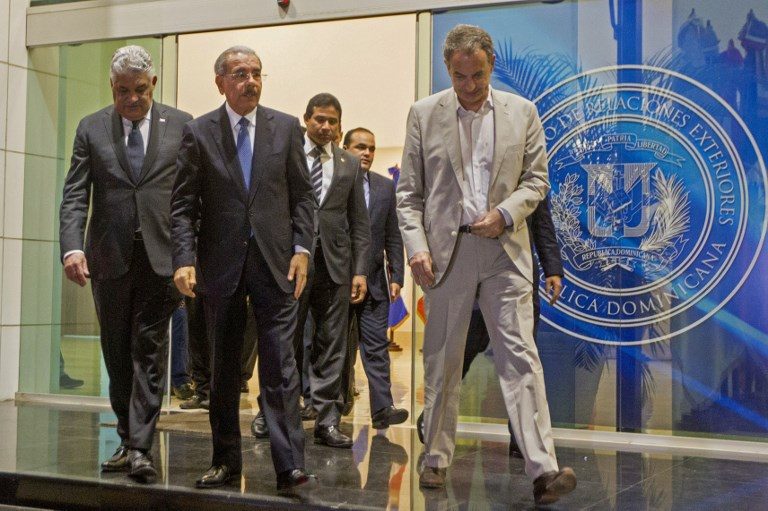SUMMARY
This is AI generated summarization, which may have errors. For context, always refer to the full article.

SANTO DOMINGO, Dominican Republic – Venezuelan government and opposition delegates agreed Thursday, September 14, to a “friendly countries” commission tasked with assisting crisis negotiations, Dominican Republic President Danilo Medina said.
Officials had begun exploratory talks a day prior, led by President Medina and former Spanish prime minister Jose Luis Rodriguez Zapatero, seeking a way out of Venezuela’s deep economic and political crisis following months of deadly protests.
“We made progress in defining an agenda of Venezuela’s problems. A commission of friendly countries that will serve as a monitoring commission was agreed on, and includes Mexico, Chile, Bolivia and Nicaragua,” the president said in a brief statement to journalists.
Mexico and Chile are critical of President Nicolas Maduro’s government, while Bolivia and Nicaragua are allies. Two other nations are likely to join in next few days, Medina added.
Delegates from Maduro’s government and the opposing Democratic Unity Roundtable coalition will meet again on September 27 for a “3rd exploratory meeting” in the Dominican capital Santo Domingo.
International powers accuse President Nicolas Maduro of dismantling democracy by taking over state institutions in a bid to counter opposition pressure for him to quit, as the country suffers an economic crisis that has caused dire shortages of food and medicine.
They accused him of a blatant power grab in July with the formation of a Constituent Assembly packed with his allies, wresting legislative power from the opposition-dominated national assembly
Maduro, elected to lead the oil-rich country in 2013, weathered months of street protests from April to July that killed 125 people amid mounting opposition demands that he step down.
Borges last week won the support of Britain, France, Germany and Spain during a tour of European capitals, upping the pressure on Maduro to reach a compromise.
“The international community has finally opened its eyes,” political commentator Carlos Romero told Agence France-Presse.
“The government is cornered and given the political and economic crisis, it suits it to have a kind of armistice,” he said.
According to the opposition, the government had insisted any negotiations recognize the legitimacy of the Constituent Assembly. – Rappler.com
Add a comment
How does this make you feel?
There are no comments yet. Add your comment to start the conversation.